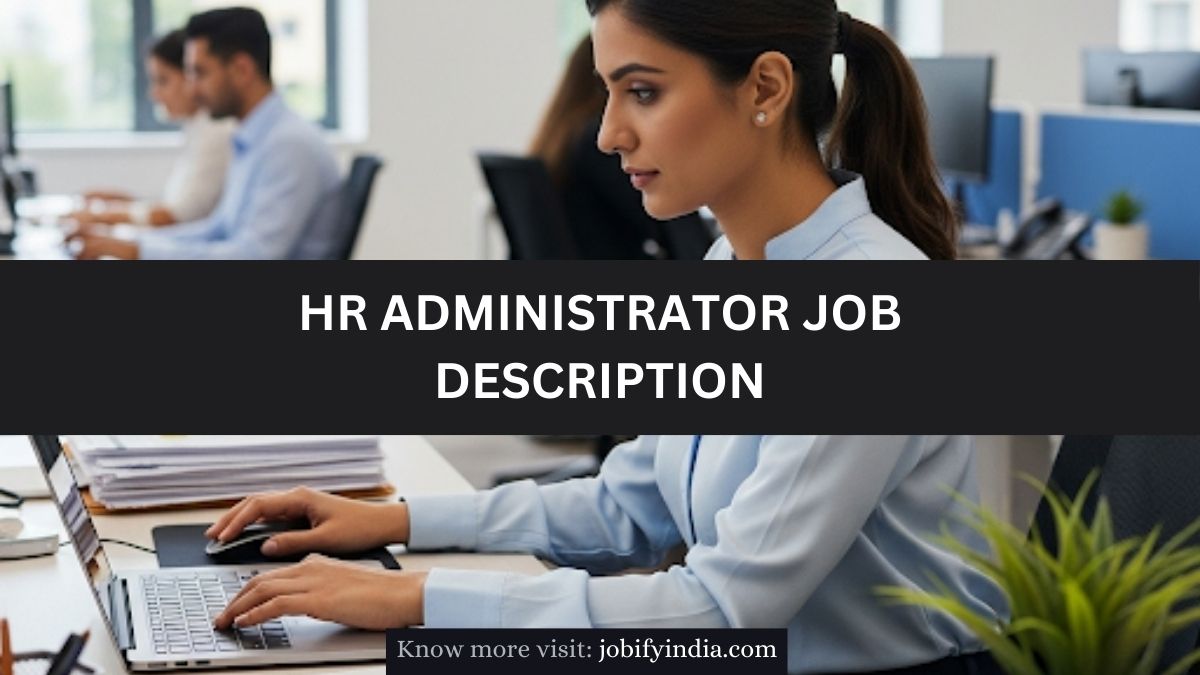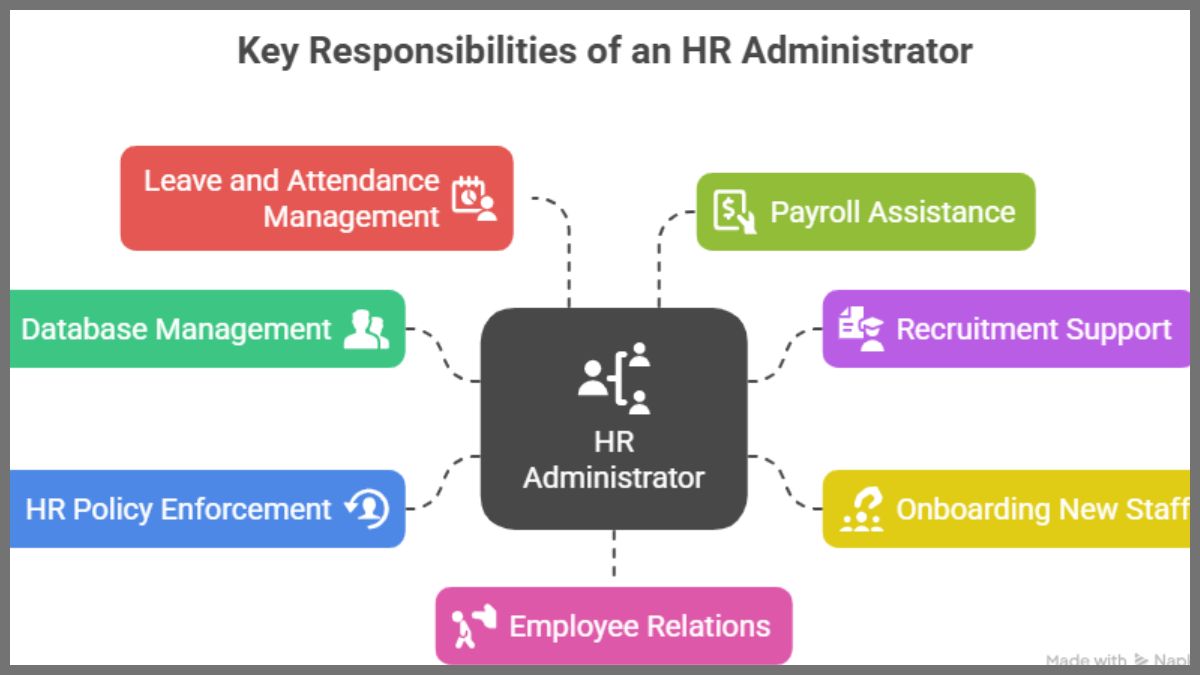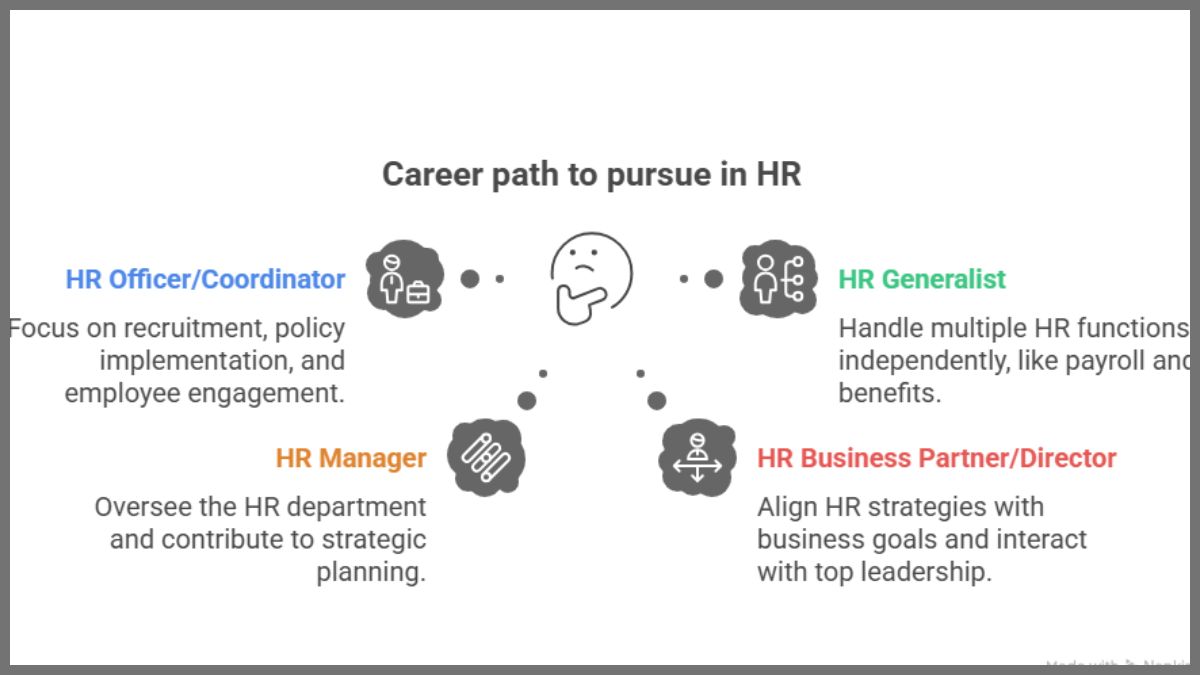Have you ever wondered who keeps everything running smoothly behind the scenes in a workplace? While managers lead teams and employees handle specific tasks, there’s someone quietly organizing, managing, and supporting everyone — and that’s exactly what you’ll find in a detailed HR Administrator job description.
If you’re considering a job in human resources or just curious about what HR administrators actually do, you’re in the right place. Let’s break down everything you need to know about this important role — what it involves, the skills required, typical career progression, and how you can get started.
What Is an HR Administrator?
Think of an HR Administrator as the backbone of the human resources department. They handle the daily tasks that keep the HR machine well-oiled. From managing employee records to assisting with recruitment and ensuring workplace policies are followed, they do a little bit of everything to keep the business running smoothly.
They may not be in the spotlight, but their work plays a big role in making the workplace efficient and organized.
Key Responsibilities of an HR Administrator
So, what does a typical day in the life of an HR Administrator look like? While the tasks may vary from one organization to another, they usually include a range of administrative and HR-related duties like:
- Database Management: Keeping employee records up to date is a top priority. This includes personal details, job titles, salaries, and performance data.
- Recruitment Support: HR Administrators assist in posting job ads, scheduling interviews, and sometimes even screening candidates.
- Onboarding New Staff: They help new hires feel at home by organizing orientation sessions, setting up profiles, and issuing contracts.
- HR Policy Enforcement: They make sure employees understand and follow company policies and procedures.
- Leave and Attendance Management: HR Admins track sick leaves, vacation days, and absenteeism using HR software or records.
- Payroll Assistance: While the finance team handles most things money-related, HR Admins may help by preparing timesheets or checking bonus eligibility.
- Employee Relations: They might be the first point of contact for employees with HR questions or concerns.
Simply put, they’re the glue that holds the HR team together.
Essential Skills for an HR Administrator
Not just anyone can jump into this role and excel; it takes a specific set of skills. If you’re thinking about stepping into an HR Administrator position, here are the key qualities and abilities you’ll need:
- Attention to detail: HR documentation has to be accurate. A small error can lead to larger issues down the line.
- Communication skills: You’ll be acting as a bridge between staff and management. Clear, polite, and professional communication is vital.
- Time management: With multiple tasks on your plate, prioritizing and meeting deadlines matter a lot.
- Problem-solving: HR issues can pop up at any time. You should be ready to think on your feet and offer solutions.
- Tech-savvy: Most HR tasks now involve using software like HRIS systems, payroll platforms, and Microsoft Office.
- Discretion: You’ll be handling sensitive personal and professional information. Trust and confidentiality are key.
Ever worked in a job where someone always had the answer, knew where everything was, and helped things run smoothly? That’s what great HR Admins do!
Educational Background and Qualifications
You don’t always need a degree in human resources to become an HR Administrator, but having the right educational background definitely helps. Here’s what most employers look for:
- A bachelor’s degree in HR, Business Administration, Psychology, or a related field.
- Some companies may accept candidates with a diploma or certification in HR, especially if they have industry experience.
- Knowledge of labor laws and basic HR practices is a big plus.
Many people also start in general administrative roles before shifting into human resources. This makes it a flexible career path if you’re testing the waters.
Career Path: Where Can an HR Administrator Role Take You?
Being an HR Administrator can be your stepping stone into a fulfilling HR career. With experience, many HR Admins climb the ladder into more senior roles such as:
- HR Officer or HR Coordinator: You’ll take on more responsibility in recruitment, policy implementation, and employee engagement.
- HR Generalist: A broader role where you handle multiple HR functions independently, like payroll, benefits, and performance reviews.
- HR Manager: Oversee the entire HR department and contribute to strategic planning and employee development.
- HR Business Partner or Director: These high-level roles involve aligning HR strategies with business goals and interacting with top leadership.
Imagine starting with organizing employee files and eventually helping shape your company’s culture and talent strategy. That’s the kind of journey HR can offer.
Why Choose a Career as an HR Administrator?
You might be wondering — with all these responsibilities, why should I consider this role?
Well, here are a few good reasons:
- It’s people-focused: If you like helping others and making a difference in the work environment, this job gives you that opportunity.
- Career growth: You won’t stay stuck in the same role forever. HR is a dynamic field with lots of room to grow.
- Transferable skills: The administrative, organizational, and interpersonal skills you gain here can be useful in almost any industry.
- Job stability: Every company, big or small, needs a team to manage its people. HR roles are always in demand.
Tips to Get Started in HR Administration
Ready to take the first step? Here are a few simple tips to help you get your foot in the door:
- Start with internships or entry-level positions: Gain hands-on experience, even if it’s in general administration.
- Pursue relevant certifications: Courses in HR management, payroll, or labor laws can boost your resume.
- Networking matters: Connect with professionals on LinkedIn and attend HR events or job fairs.
- Keep learning: HR trends change often. Stay updated on best practices, technologies, and legal requirements.
You don’t need to have years of experience to land your first HR role — just the right skills, attitude, and willingness to learn.
Final Thoughts
Being an HR Administrator is far from a boring 9-to-5 job. It’s a dynamic, people-oriented role that touches every part of an organization. Whether you’re organizing employee data, helping with interviews, or making sure policies are followed, your work helps create a better workplace for everyone.
So if you’re organized, naturally curious, and love working with people, this could be your perfect fit. Why not explore this career path and take the first step toward becoming a valuable part of any team?
After all, behind every successful company is a strong HR team — and HR Administrators are right at the heart of it.






